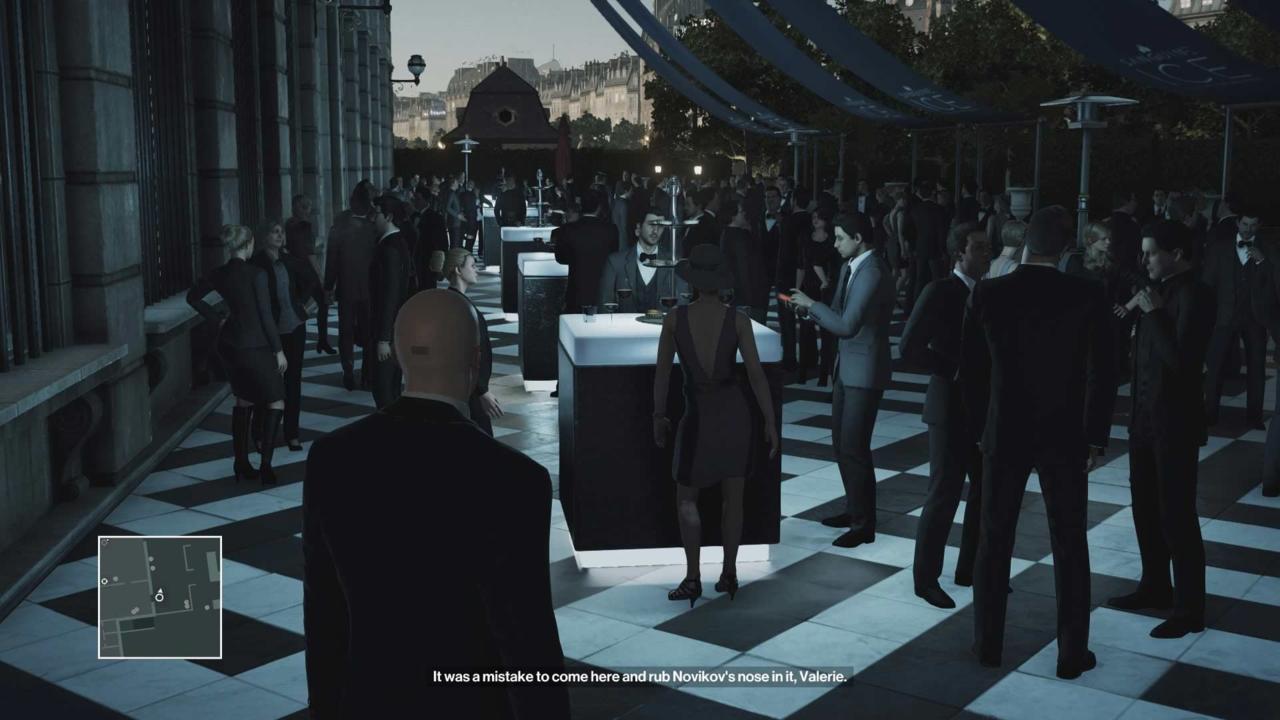Agent 47 never takes this long. The 2016 version of Hitman plays like the longest assassination of the chrome-domed killer’s lengthy career, thanks to developer IO Interactive’s decision to issue the game via six chapters released roughly from spring to fall. But I’m certainly not complaining about the marketing, given that the final package showcases some of the most enthralling exploits of gaming’s most infamous murderer-for-hire. Sprawling levels, tremendous attention to detail with both graphics and sound design, and countless assassination options make this an engrossing experience that includes some of the best replay value ever seen in a game.
Having come into this season of Hitman only after it was complete, I can’t render a judgment about how the game was released in an episodic format. I’m glad that I got to play through it as a complete experience, and I can’t imagine having to wait weeks to go on my next assignment. But at the same time, I see the appeal of tackling each of the game’s six separate assignments (plus the opening training missions that flash back to the beginning of Agent 47’s career) one by one, given just how much gameplay is jammed into each of them. The individual missions here send you jetting all over the globe like a bald James Bond with a barcode on the back of his head. Everything is linked via brief cutscenes that focus on a figure from Agent 47’s past. But the levels are so big and so packed with details that they take on lives of their own, much like separate movies in a franchise.
The long-running international flavor of the Hitman series has been spiced up here with unique locations that take place in virtually every corner of the world. You prowl a Paris fashion show, sneak around a luxurious villa on the Italian coast, venture into mobs rioting in Moroccan souks, stalk a rock star at a five-star hotel in Thailand, assault the leaders of a militia on a compound in Colorado, and finally explore a private hospital atop a snowy mountain in Japan. Each level looks fantastic and is stuffed with all sorts of nooks and crannies to explore and hundreds of NPCs to interact with--many of whom come with dialogue and specific routines and behaviors that can be figured into your assassinations. The only drawback with the overall presentation is the quality of the NPC dialogue, which is nicely varied and well acted but virtually all spoken with a standard American accent that can kill your suspension of disbelief. Hearing Italian thugs and Cuban soldiers all speaking like average American Joes really takes you out of the moment, at least until you get accustomed to this oddity.
The attention to detail is otherwise superb, though. I typically took a good hour or two wandering around each level, listening in to conversations, and just generally getting the lay of the land before deciding on a course of action. The game offers dozens of ways to kill every target--and even more routes to take to get to them before you shoot them, garrotte them, drown them in toilets, blow them up, poison them, blast them out of an ejector seat in a jet plane, and so on. Every assignment also comes with loads of different people in loads of different professions, which provides even more routes to your victims via the outfits you can remove from their corpses for use as disguises. Want to stay in a secret-agent tux? Or even a snazzy summer suit? Sure thing. But you can also ditch the formal outfits for the garb of a security guard, a male supermodel, a scientist in a hazmat suit, a plague doctor, a chef, and many, many more.
Granted, all of the above makes Hitman more of a funhouse ride than a grim series of contract killings. While it’s fun to encounter switches that drop chandeliers, a hookah that can be poisoned, convenient wire-and-puddle combos that can be turned into electrocution traps, and murderous random accoutrements from bombs to scissors to swords to bricks to fire extinguishers to pretty much everything but the kitchen sink, everything goes well over the top. The game is more of a cartoon than any sort of authentic exploration of the world of contract assassinations--which is certainly a good thing, both for the way this lightens the mood (any game where you can blow up a guy who’s puking into a toilet isn’t one that takes itself too seriously, despite the body count) and also how it provides so much room for murderous creativity.

I don’t think I’ve ever played a game with so many options to reach its goals. The first time through a level is just the beginning. Replay value is spectacular, and maybe even unprecedented for a Hitman game, given the massive size and scope of the levels, the number of NPCs, the number of murderous gadgets and weapons littering every room and corridor, and also because of the added options that open up after an initial run-through. Completing mission challenges unlock frills like new weapons, disguises, and starting locations, which of course offer up new ways to get to and finish off your marks.
And then there is Escalation Mode, a new feature that adds requirements to existing levels. It basically creates new missions that involve you offing multiple new targets in specific ways. Difficulty goes up with each successful assassination assignment. Escalations start with things like murdering a few people in specific ways, say by explosives, and then move on to more complex goals like killing while wearing a specific disguise, finishing off all of your targets in a tight time limit, dumping all the bodies in one location, and so forth.
Elusive Targets is a timed mode that lets you go after special victims (who can’t be seen on the map) with just one chance at success before you lose the contract forever. IO releases these victims into the wild at set times and leaves them up for limited periods of time until they vanish, never to be heard from again. It’s a great added incentive to keep going back to the game, even long after the standard missions and their added challenges wear thin. And Contracts Mode (brought back from 2012’s Hitman: Absolution) allows you to mark random NPCs as targets and set kill requirements, creating missions that can be shared with other players.
Finally, PS4 players have access to one more series of exclusive missions called the Sarajevo Six. These sideline assignments that follow along with your trips around the world to complete your main goals see Agent 47 tracking down a half-dozen war criminals who’ve been wanted ever since they participated in war crimes during the Siege of Sarajevo some 20 years ago. It’s a great story with a nice tie-in to the real war in the former Yugoslavia, but the assignments are pretty straightforward and don’t don't offer the variety of escalation/contracts. These bonus contracts still probably make the PS4 version of the game the best to buy, although you’re really not missing much by playing on PC or Xbox One.
You can approach Hitman in two very different ways. You can use the default settings, which sees the game function more traditionally. This primarily means that you’re guided through the game via highlighted Opportunities that underline when conversations and circumstances can be used to set up assassinations. It’s kind of a tip system, pointing you in the direction that you might want to go and turning the game into a relatively linear experience. I found Opportunities invaluable for initial runs through missions, as the tremendous size of the levels make them very daunting to approach without any hand-holding--at least at first. Another enhancement is the Instinct feature, held over from Hitman: Absolution, but scaled back in some ways so that you can no longer use it to track NPC movements or to avoid detection while disguised. Still, even though the option is supposed to replicate Agent 47’s preternatural abilities as an assassin, it kind of turns him into a superhero with X-ray eyes and mind-reading skills. So, I avoided its use.
Or you can shut all that stuff off and venture into a complete sandbox experience, where you have nothing to guide you to your targets save your own wits and observation skills. This offers the purest, most rewarding Hitman experience, but it’s also probably best reserved for experienced players in search of increased difficulty or a new way to approach levels you’ve already bested with the above features turned on. I found the levels too vast to explore without some assistance (and using Opportunities is also a big help when trying to pull off the most outrageous kills), but I can see the value of turning off these crutches for a second go-round. Going in without this help makes everything more realistic and emphasizes how much you have to watch and listen in order to plan out a path to your kills.

My only lingering issues with Hitman involve a couple of relatively minor points. The first involves the internal logic of the game. At times, it seems to be somewhat random whether or not you an NPC or victim notices you. I don’t know if it’s the luck of the draw, but sometimes you’re seen as a suspicious character right off the bat, even if you’re wearing the right disguise and (seemingly) haven’t done a thing to draw attention to yourself. Even accidentally bumping up against somebody can raise the alarm, which is really annoying at times--the number of NPCs packed into most levels makes it impossible to get through crowds without letting fly an errant elbow.
Enemy AI is a little slow on the draw when it does identify you, though. Lengthy pauses make it reasonably easy to run off or shoot a guard or three in the face, even well after they’ve figured out that the weird bald guy with the ominous head tattoo is actually up to no good. The second issue is the irritating need to be connected online to play the game. It’s totally unnecessary for a solo experience like this. It seems to slow the game down somewhat (load times are way too long), and the servers disconnect on occasion for short periods of time, leaving you unable to play.
Delayed gratification from the episodic release schedule or not, this 2016 take on Hitman is a brilliant game. Expansive level design and nearly unlimited replay value courtesy of so many routes to your assassinations (and so many methods with which to carry them out) make the experience almost completely different each and every time you play. Yes, Agent 47 took his time getting here, but it was time well spent.



















